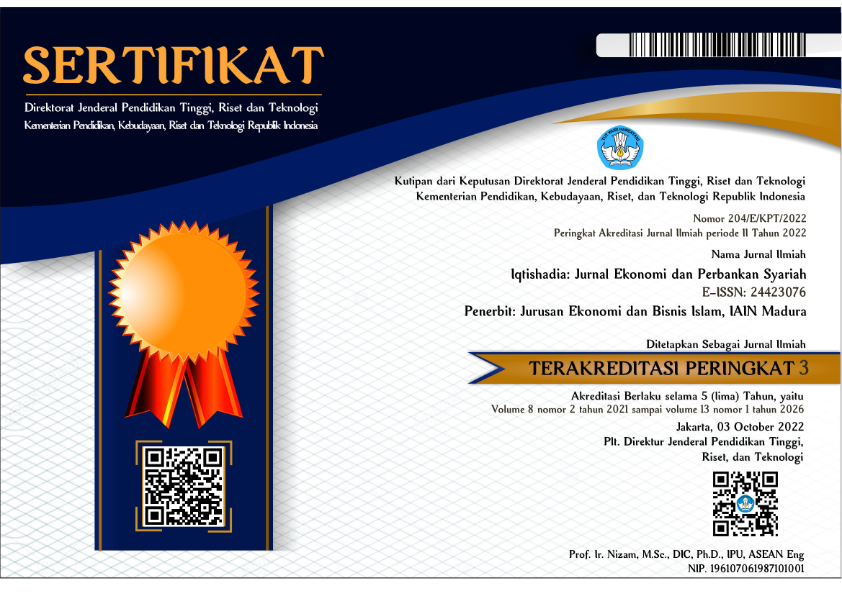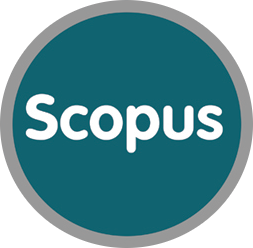Do Halal Literacy, Religiosity, and Legal Compliance Affect the Motivation of Applying for Halal Product Certification?
 Abstract views: 132
,
Abstract views: 132
,
 PDF downloads: 68
PDF downloads: 68
Abstract
The enactment of regulations regarding the obligation to guarantee halal products in Indonesia according to Law Number 33 2014 is mandatory and binds for SMEs owners to have halal guarantees for all products that are offered. However, the number of Indonesian SMEs that have been halal-certified remains very low and far from their potential. The purpose of this study was to analyze the effect of the level of literacy, religiosity, and legal compliance of SMEs owners on halal product guarantee regulations using a quantitative approach with a research instrument in the form of a questionnaire distributed to SMEs owners in Depok. This study used a purposive sampling technique and obtained as many as 152 food SMEs that had not been halal certified. The results of this study show that halal literacy and religiosity influence the motivation of SMEs owners to apply for halal certifications. There are still SMEs owners who do not know or understand the rules and requirements for applying for halal certification. Legal compliance has no influence on SME owners’ motivation to apply for halal product certification. The majority of respondents complied with business regulations but did not have halal certification. The results of this study are expected to contribute to the implementation of halal certification policies and growth of the halal industry in Indonesia.
Downloads
References
Abdullah, M., Mulyadi, H., Basudani, W. A., & Wiharso, G. (2022). Strategi The Body Shop Indonesia Dalam Membentuk Loyalitas Konsumen. Jurnal AKRAB JUARA, 7(2), 221-23-.
Akim, A.-, Konety, N., Purnama, C., & Adilla, M. H. (2019). Pemahaman Usaha Mikro, Kecil Dan Menengah (Umkm) Di Jatinangor Terhadap Kewajiban Sertifikasi Halal Pada Produk Makanan. Kumawula: Jurnal Pengabdian Kepada Masyarakat, 1(1), 31. https://doi.org/10.24198/kumawula.v1i1.19258
Al Mushofi, M., & Syamsi, B. A. (2021). Respon UMKM Produk Makanan Terhadap Implementasi Undang-Undang Nomor 33 Tahun 2014 Tentang Jaminan Produk Halal di Kabupaten Pamekasan. Kaffa: Jurnal Fakultas KeislamanKaffa: Jurnal Fakultas Keislaman, 2(2), 1–19.
Anggraeni, R. (2021). UMKM yang Kantongi Sertifikasi Halal Tercatat Hanya Satu Persen. Idxxchannel.Com.
Dawam, K., & Iswandi, A. (2023). Analysis of The Factors That Influence The Perceptions of Culinary Business Owners Regarding Intention to Register For Halal Certificates. Perisai : Islamic Banking and Finance Journal, 7(2), 143–176. https://doi.org/10.21070/perisai.v7i2.1663
Effendi, M. A. (2021). Survei Kemenag: Religiusitas Masyarakat Meningkat di masa Pandemi. Kemenag. https://kemenag.go.id/read/survei-kemenag-religiusitas-masyarakat-meningkat-di-masa-pandemi
Fathoni, M. A. (2020). Potret Industri Halal Indonesia: Peluang dan Tantangan. Jurnal Ilmiah Ekonomi Islam, 6(3), 428. https://doi.org/10.29040/jiei.v6i3.1146
Fatimah, N. (2014). Jaminan Produk Halal Di Indonesia Terhadap Konsumen Muslim. Jurnal Likuid, 1(1), 43. http://www.springer.com/series/15440%0Apapers://ae99785b-2213-416d-aa7e-3a12880cc9b9/Paper/p18311
Fauziah, D. R. (2021). Analisis Implementasi Jaminan Produk Halal Terhadap Pelaku UMKM. Journal of Islamic Economic and Business Studies, 4(2), 100.
Febrimayanti, F. (2020). Implementation of Halal Certification for Micro, Small, And Medium Enterprises In West Tulang Bawang District. Administrative and Environmental Law Review, 1(2), 75–82. https://doi.org/10.25041/aelr.v1i2.2148
Giyanti, I., & Indriastiningsih, E. (2019). Effect of SME Food Entrepreneurs Knowledge on Halal Certification for Certified Awareness Using Partial Least Square. Jurnal Teknik Industri, 20(2), 36. https://doi.org/10.22219/jtiumm.vol20.no2.36-47
Hasan, H., Sulong, R. S., & Tanakinjal, G. H. (2020). Halal Certification Among the SMEs in Kinabalu, Sabah. Journal of Consumer Sciences, 5(1), 16–28. https://doi.org/10.29244/jcs.5.1.16-28
Herman, S. (2023). Industri Halal dan Ekonomi Digital : Peluang Bisnis dan Karir di Masa Depan. Tamkin Jurnal Pemberdayaan Tazkia, 1(1), 30–40.
Irwan, & Adam, K. (2015). Metode Partial Least Square (PLS) dan Terapannya (Studi Kasus: Analisis Kepuasan Pelanggan terhadap Layanan PDAM Unit Camming Kab. Bone). Jurnal Teknosains, 9(1), 53–68.
Junianto, D., & Sabtohadi, J. (2020). Pengaruh Sistem Perjanjian Kerja Waktu Tertentu Dan Motivasi Kerja Terhadap Kinerja Karyawan Pada Industri Pabrik Gula. Equilibrium : Jurnal Ilmiah Ekonomi, Manajemen Dan Akuntansi, 9(1), 1–9. https://doi.org/10.35906/je001.v9i1.423
Kementrian Agama Indonesia. (2021). Update Sertifikasi Halal di Indonesia.
Kementrian Perindustrian Republik Indonesia. (2021). Indonesia Digadang Jadi Pusat Produksi Halal Dunia. Siaran Pers. https://www.kemenperin.go.id/artikel/22817/Indonesia-Digadang-Jadi-Pusat-Produksi-Halal-Dunia
Mansbridge, J. (1998). Skin substitutes to enhance wound healing. Expert Opinion on Investigational Drugs, 7(5), 803–809. https://doi.org/10.1517/13543784.7.5.803
Nopita Sari, S., Trihantana, R., & Purnama, B. (2021). Pengaruh Kesadaran Halal Usaha Mikro, Kecil dan Menengah (UMKM) di Pamijahan dan Cibungbulang Kabupaten Bogor Terhadap Motivasi Sertifikasi Halal. Sahid Business Journal, 1(01), 92–103. https://doi.org/10.56406/sahidbusinessjournal.v1i01.31
Nur, M. R. T., Fathoni, M. A., & Sari, L. P. (2021). The Impact of Awareness, Lifestyle and Halal Certification on The Buying Interests of MSME’s Halal Food Products in DKI Jakarta. El-Barka: Journal of Islamic Economics and Business, 4(2), 156–189. https://doi.org/10.21154/elbarka.v4i2.3207
Nuriyah, A., Endri, E., & Yasid, M. (2018). Micro, Small-Financial Financing and Its Implications on the Profitability of Sharia Banks. DeReMa (Development Research of Management): Jurnal Manajemen, 13(2), 175. https://doi.org/10.19166/derema.v13i2.1054
Ramadhan, A., & Gunanto, E. Y. A. (2021). Decision on Halal Certification of Food and Beverage Products Processed by UMKM Products in Tangerang City - Study of Religiosity, Regulation, and Branding. Jurnal Ilmiah Ekonomi Islam, 7(2), 786–797. https://doi.org/10.29040/jiei.v7i2.2490
Sari, M. K. (2020). Kesadaran Hukum Pelaku Usaha Mikro Kecil Menengah Berkaitan Kepemilikan Sertifikat Halal Pada Produk Olahan Pangan. Novum : Jurnal Hukum, 7.
Sari, R. P., & Firdaus, A. (2018). The Impact of Total Quality Management Implementation on Small and Medium Manufacturing Companies. Esensi: Jurnal Bisnis Dan Manajemen, 8(1), 67–78. https://doi.org/10.15408/ess.v8i1.5852
Yunus, Y. H. (2021). Efektivitas UU Nomor 33 Tahun 2014 tentang Jaminan Produk Halal (JPH) Terhadap Sadar Halal Para Pelaku UMKM di Kota Gorontalo. Ideas: Jurnal Pendidikan, Sosial, Dan Budaya, 7(1), 47. https://doi.org/10.32884/ideas.v7i1.326
The journal operates an Open Access policy under a Creative Commons Non-Commercial Share-Alike license. All articles published Open Access will be immediately and permanently free for everyone to read and download.
• Creative Commons Attribution-NonCommercial (CC-BY-NC)

Iqtishadia: Jurnal Ekonomi dan Perbankan Syariah by http://ejournal.iainmadura.ac.id/index.php/iqtishadia is licensed under a Creative Commons Attribution-NonCommercial 4.0 International License.
Based on a work at http://ejournal.iainmadura.ac.id.

























